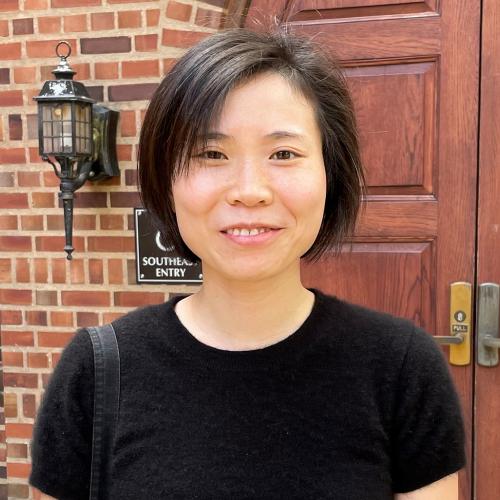Article
Two graduate students will present their research at the final Beckman Graduate Student Seminar of the spring semester: Yuanxi Fu, information sciences; and Gang Xiao, molecular and integrative physiology.
The event takes place at noon Wednesday, May 1 in 5602 Beckman Institute. Lunch will be provided to attendees who register in advance.
"Preparing a knowledge infrastructure for the AI scientist"
 Yuanxi Fu.Artificial intelligence has increasing potential for science. Recent breakthroughs in deep learning and large language models inspire interest in an AI scientist — an artificial intelligence capable of automated scientific discovery. Such an AI scientist might have the potential to outperform human scientists in memorizing scientific knowledge and processing data, but human scientists will still have a crucial role to play. The future of scientific research will likely involve close collaboration between human scientists and AI scientists. An AI scientist must be equipped with up-to-date and valid scientific knowledge. Therefore, it should NOT indiscriminately ingest all available scientific publications and scientific data. To ensure that the knowledge an AI scientist ingests is up-to-date and valid, we need a knowledge infrastructure that provides not only knowledge (e.g., publications, data) but also information about the quality of the knowledge, aligned with the most up-to-date scientific opinions. I will present two research projects that lay the conceptual foundation for key functional components of this dynamic, quality-aware knowledge infrastructure: (1) determining the impact of citing unreliable resources using argumentation theory and (2) tracking changes in scientific consensus with network analysis.
Yuanxi Fu.Artificial intelligence has increasing potential for science. Recent breakthroughs in deep learning and large language models inspire interest in an AI scientist — an artificial intelligence capable of automated scientific discovery. Such an AI scientist might have the potential to outperform human scientists in memorizing scientific knowledge and processing data, but human scientists will still have a crucial role to play. The future of scientific research will likely involve close collaboration between human scientists and AI scientists. An AI scientist must be equipped with up-to-date and valid scientific knowledge. Therefore, it should NOT indiscriminately ingest all available scientific publications and scientific data. To ensure that the knowledge an AI scientist ingests is up-to-date and valid, we need a knowledge infrastructure that provides not only knowledge (e.g., publications, data) but also information about the quality of the knowledge, aligned with the most up-to-date scientific opinions. I will present two research projects that lay the conceptual foundation for key functional components of this dynamic, quality-aware knowledge infrastructure: (1) determining the impact of citing unreliable resources using argumentation theory and (2) tracking changes in scientific consensus with network analysis.
Yuanxi Fu is a third-year Ph.D. student in information science working with Jodi Schneider in the School of Information Sciences. She studies argumentation in science and explores how to use scientific argumentation to inform the design of AI for Science.
Behavioral task modulates neural activity in the dorsal inferior colliculus neurons of mice
 Gang Xiao.Sensory perception can vary depending on different behavioral contexts. The activity of neurons throughout the mammalian brain has been shown to be modified during task engagement in many sensory modalities, and the auditory system is no exception. Many previous studies have shown that task engagement modulates neural activity at higher levels in the auditory pathway, including the thalamus and cortex. A recent study also found that task-engagement-related modulation is present as early as in the inferior colliculus while it is still not clear if modulation occurred throughout the IC or if it is specific to particular subregions. The spatial pattern of the modulation is also not clear. In this study, we developed a mouse model which has good hearing for longer period time than other transgenic strains while keeping the transgenic traits available. Then we developed a head-fixed 2-alternative-forced-choice task platform for mice and trained the mice either to differentiate two tones or two groups of tones. Finally, we used 2-photon microscopy to study the neural activity in the dorsal IC under task and passive conditions to look for answers to the above questions.
Gang Xiao.Sensory perception can vary depending on different behavioral contexts. The activity of neurons throughout the mammalian brain has been shown to be modified during task engagement in many sensory modalities, and the auditory system is no exception. Many previous studies have shown that task engagement modulates neural activity at higher levels in the auditory pathway, including the thalamus and cortex. A recent study also found that task-engagement-related modulation is present as early as in the inferior colliculus while it is still not clear if modulation occurred throughout the IC or if it is specific to particular subregions. The spatial pattern of the modulation is also not clear. In this study, we developed a mouse model which has good hearing for longer period time than other transgenic strains while keeping the transgenic traits available. Then we developed a head-fixed 2-alternative-forced-choice task platform for mice and trained the mice either to differentiate two tones or two groups of tones. Finally, we used 2-photon microscopy to study the neural activity in the dorsal IC under task and passive conditions to look for answers to the above questions.
Gang Xiao is a Ph.D. student in the Department of Molecular and Integrative Physiology at the University of Illinois Urbana-Champaign. He graduated with a bachelor’s degree in biological science from Zhejiang University, an M.Res. degree of molecular and cellular bioscience from Imperial College London and an M.Sc. degree in audiological science from University College London.
Beckman Institute for Advanced Science and Technology